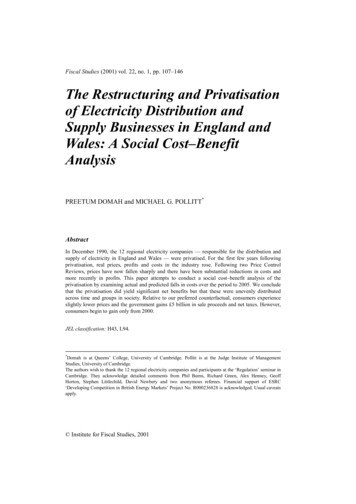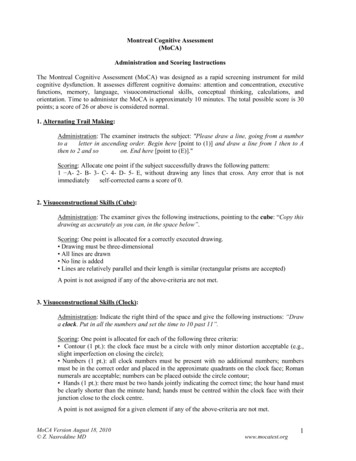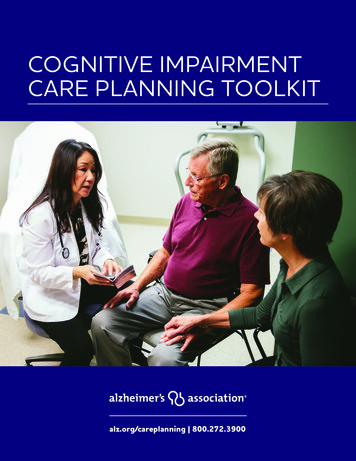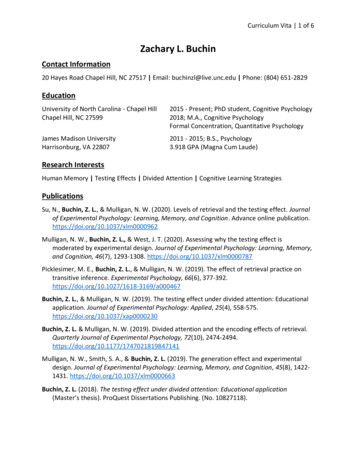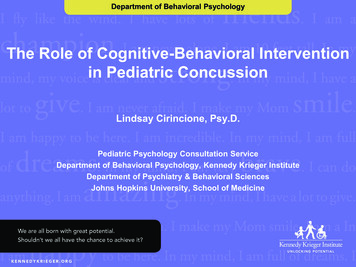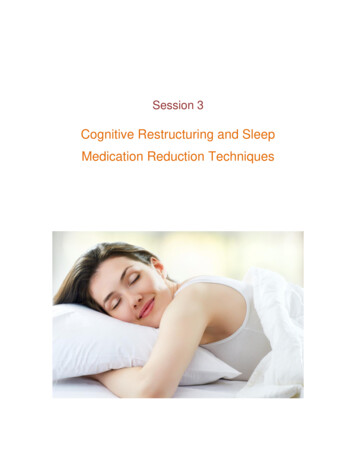
Transcription
Session 3Cognitive Restructuring and SleepMedication Reduction Techniques
Lesson 1: Introduction to Cognitive RestructuringNegative Thoughts About SleepA major problem with insomnia is the worry that it will affect you the next day. Negative, stressfulthoughts about sleep worsen insomnia by triggering emotions such as anxiety or frustration thatmobilize the stress response. In turn, the stress response strengthens the wakefulness system,weakens the sleep system, and makes it harder to sleep. And the harder it is to sleep, the moreanxious one feels about not sleeping!NEGATIVE SLEEP THOUGHTSINSOMNIAHere are some examples of negative sleep thoughts that are very common:I must get eight hours of sleep.I will not be able to function tomorrow.My insomnia is going to cause health problems.I cannot fall asleep without a sleeping pill.I did not sleep at all last night.Recognizing and Changing Negative Sleep ThoughtsAs you will learn in this session, negative sleep thoughts are usually distorted and inaccurate.They only make your insomnia worse.You can overcome insomnia by learning to recognize and change your negative sleep thoughtswith cognitive restructuring. Cognitive restructuring means replacing negative sleep thoughts withmore helpful, accurate thoughts about sleep. The goal of cognitive restructuring is simple yetpowerful: by recognizing and replacing your negative sleep thoughts with more accurate, positivethoughts about sleep, you will reduce worry and other negative emotions that trigger the stress
response and disturb your sleep. The more you practice cognitive restructuring, the better you willsleep.Keep in mind that cognitive restructuring is not the same as pretending you don’t have insomniaor simply using the power of positive thinking. It means thinking about insomnia less negativelyand more accurately.Scientific Findings: Sleep and InsomniaTo recognize and replace your negative sleep thoughts with more accurate, positive thoughtsabout sleep, you must first learn about some important scientific findings concerning severalaspects of sleep and insomnia: Sleep duration, health, and daytime functioningThe effects of sleep loss on daytime performanceHow much sleep you think you are getting
Lesson 2: Sleep Duration, Health, and Daytime FunctioningThe Eight Hour Sleep MythAlthough many people think that we need at least eight hours of sleep to stay healthy, recentstudies show that people who sleep seven hours live longer than people who sleep eight: Three studies involving over a million people demonstrated that people who sleep sevenhours per night have the lowest death rates and those who sleep eight or more hours pernight have progressively increasing rates of death.The studies showed that sleeping five hours per night is associated with longer lifeexpectancy than sleeping nine hours per night.All three studies are in agreement that long sleep is associated with greater mortality thanshort sleep.The findings of these three studies involving enormous samples (up to one millionpeople) are consistent with a dozen smaller studies, and no persuasive studies havecontradicted these findings.Key Concept: This means that you do not have to worry about getting eight hours of sleepper night to stay healthy.Similarly, many of us do not need eight hours of sleep to function effectively during the day: Many individuals cannot sleep eight hours even if they try.The amount of sleep that we need to feel alert during the day varies from person toperson. The majority of adults sleep less than eight hours per night and report feelingrested during the day.If we needed eight hours of sleep, we would expect adults to average about eight hoursof sleep but this is not the case: adults average about seven hours of sleep.The majority of adults who sleep less than eight hours report positive mood during theday, feel optimistic, and are satisfied with their lives.
Key Concept: This means that you do not have to worry about getting eight hours of sleepper night to function effectively during the day.Sleep Loss and Daytime PerformanceWhat about the effects of sleep loss on daytime performance? Although research shows that notgetting enough sleep can make it harder to do your normal daily tasks, the effects of sleep lossalso depends upon how much sleep is lost and how often it happens. Research also shows that: Everyone is different. Some people are affected a lot by sleep loss while others may beaffected very little.Some individuals show a remarkable tolerance for sleep loss, particularly if the person ismotivated to cope with sleep loss (such as caring for a newborn) or the sleep loss occursunder positive circumstances (such as a vacation or a party).Some of the effects of sleep loss may actually be due to the effects of stress that led tothe sleep loss. In fact, stress has been shown to have much greater effects on ourfunctioning than sleep loss.Most studies on sleep deprivation are typically on young, healthy, eight-hour sleeperswho are restricted to four hours of sleep. However, these younger eight hour sleepers aremore susceptible to the effects of sleep loss than shorter sleepers or older sleepers.Studies on insomnia patients show that sleep loss does not affect them as much asnormal sleepers.Key Concept: This means that sleep loss does not always have adverse effects on daytimefunctioning.
Lesson 3: Sleep Loss and “Core” SleepCore SleepNow let’s explore the concept of core sleep. Research also suggests that many individuals canmaintain performance for extended periods of time on about five and half hours of sleep, or whatsome sleep researchers call “Core Sleep”: People who need to maintain performance under challenging circumstances -such asrescue workers, armed services personnel, physicians, and solo yacht racers - canmaintain their performance with five to six hours of sleep.Studies on insomnia patients show that they average just under six hours of sleep yet donot have poorer daytime performance or alertness than good sleepers.The reason core sleep can maintain performance in those who suffer from insomnia isthat it contains 100 percent of our deep sleep (the most important stage of sleep) and fiftypercent of our dream sleep (the second most important stage of sleep).Core sleep does not have to be obtained continuously (that is, we can sleep for twohours, be awake for an hour, and then sleep three or four more hours). Also, your brain is“programmed” to get core sleep (that is, it will do its best to obtain core sleep each night).Key Concept: This is not to say that we only need core sleep, since most people needadditional sleep to feel their best. However, it does mean that your performance willusually not suffer significantly if you obtain core sleep.
Lesson 4: Perceived vs. Actual Sleep DurationYou Are Getting More Sleep Than You ThinkResearch shows that people with insomnia are getting more sleep than they think: They overestimate how long it takes to fall asleep and how long they are awake duringthe night.They underestimate how much sleep they get.This misperception of sleep is because they perceive stage 2 sleep as wakefulness; and, the factthat time perception is altered under the stressful circumstances of lying awake. As a result,perception of time seems longer than actual clock time.Key Concept: This means that, by recognizing you are likely getting more sleep than youthink, you will reduce negative sleep thoughts and sleep better.
Lesson 5: Insomnia and Daytime MoodFinally, let’s take a look at the relationship between insomnia and daytime mood.It’s going to be a miserable daybecause I didn’t sleep wellYou may notice that the biggest effect of insomnia is on your mood the following day. You mayfeel irritable, worried, tired, or a little depressed. This is important to know for changing yournegative sleep thoughts: In most cases, it is only your mood that may be affected for the day after a bad night’ssleep.It is not just how much sleep you lose that affects your daytime functioning but also yournegative thoughts about your sleep loss. If you can reduce negative thoughts about yoursleep loss, you will reduce the effects of insomnia on your daytime mood and functioning.If you wake up and begin your day with a negative sleep thought such as “The day isgoing to be miserable because I did not sleep well”, it is the combination of sleep lossand negative mood from this thought that affects your daytime functioning. You canprove this to yourself by noticing that sleep loss due to positive events (such as parties,vacation, etc.) does not have as much of a negative impact on daytime functioning.
Lesson 6: Practicing Cognitive RestructuringNow that you have spent some time learning about the scientific findings concerning sleep andinsomnia, you are ready to practice cognitive restructuring each day to reduce your negativesleep thoughts and improve your sleep and your daytime mood.Your Negative Sleep ThoughtsTo begin, you can identify your most frequent negative sleep thoughts using the list below. Foreach negative sleep thought, you will be given positive sleep thoughts that you can use to replacethose negative sleep thoughts. The positive sleep thoughts that you will be given are based onthe information you just learned about involving sleep, health, and performance; and, on theinformation we reviewed in Session 1 concerning basic facts about sleep and sleeping pills.You will begin to use these positive sleep thoughts each day to replace your negative sleepthoughts. Review them regularly. It may be helpful to write them down, print them or keep themby your bed to refer to at night or when you wake up in the morning.The 10 Most Common Negative Sleep ThoughtsNow, choose the negative sleep thoughts from the following list that are similar to those youexperience most frequently, then review the positive sleep thoughts on the next page that youcan use to replace those specific thoughts: I will never fall asleep.I woke up in the middle of the night/early morning and feel wide awake. This means Iwill not be able to fall back to sleep.I will not be able to function tomorrow.I must get eight hours of sleep.My insomnia is going to cause health problems.I did not sleep at all last night.I cannot fall asleep without a sleeping pill.I feel terrible today due to my insomnia.I will never learn to sleep better.What is wrong with me? I must have a psychological problem.Positive Sleep Thoughts That You Can Use to Replace Specific Negative Sleep ThoughtsPositive Sleep ThoughtsTo ReplaceNegative Sleep ThoughtsI will never fall asleep I am more likely to fall asleep as my body temperature falls throughout the night. My brain wants to obtain my core sleep.
I woke up in the middle of the night or early morning and feel wide awake. This means Iwill not be able to fall back to sleep. It is normal to initially feel alert if I awaken at the beginning or end of dream; drowsinesswill soon follow. If I awaken after about five and a half hours of sleep, I obtained my core sleep. If I do notfall back to sleep, I will be okay.I will not be able to function tomorrow. In most cases, the worst thing that may happen if I do not sleep well is that I may not bein the best mood during the day. Sleep loss does not always have a significant impact on my daytime functioning. I can handle sleep loss, especially if it is only happening a few nights per week. My performance will not suffer significantly if I get my core sleep. My functioning will improve during the day as my body temperature rises.I must get eight hours of sleep. Sleep requirements vary from person to person. Sleeping seven hours per night is associated with the longest life expectancy.My insomnia will cause health problems. There is no cause-and-effect evidence that insomnia causes any significant healthproblems.I slept very little or not at all last night. I am probably getting more sleep than I think I am.I cannot fall asleep without a sleeping pill. As I learn these CBT techniques, I will fall asleep more easily on my own. I am better off without sleeping pills since many of them cause a hangover effect andreduce my deep sleep. Sleeping pills do not work that well anyway, since part of their effect is actually a placeboeffect. It will become easier to fall asleep without a sleeping pill the more I try it.I feel awful today because I did not sleep well. My daytime functioning is due in part to my negative sleep thoughts. If I minimize mynegative sleep thoughts, I will improve my daytime functioning. My daytime functioning is not just affected by my sleep.I will never learn to sleep better. These techniques work for most people with insomnia, they will work for me. My sleep will get better as I learn these CBT techniques.What is wrong with me? I must have a psychological problem Most cases of insomnia are due to learned thoughts and behaviors, not mental healthproblems. Insomnia is very common. It affects over half of adults.
Lesson 7: Sleeping PillsPutting Sleeping Pills to RestIf you are taking sleep medication and you want to reduce the amount you are taking, you areready to begin sleep medication reduction techniques along with the cognitive restructuringtechniques this week.Several studies on CBT have shown that 50% of people who regularly use sleep medicationreduce the amount they take and the other 50% stop entirely. Two important elements aid thesuccess of these sleep medication reduction techniques: You can reduce sleeping pill use at your own pace.The techniques allow you to gradually decrease sleep medication rather than stoppingabruptly “cold turkey”, which can backfire and cause increased anxiety and insomnia.Putting Sleeping Pills to RestSince regular users of sleeping pills can experience withdrawal symptoms or rebound insomnia ifthey stop sleeping pill use abruptly, gradually tapering sleeping pill use minimizes the likelihood ofthese problems. Be sure to discuss these medication reduction guidelines with your physician.Here are the sleep medication reduction techniques:First, begin by determining the number of nights you generally use sleeping pills during the week,and the typical number of pills on those nights.Next, reduce the number of pills you are taking by one-half on two nights this week. Space thetwo nights apart. If you are only taking one pill, cut the dose in half and consider this a half pill.Choose easier nights when there is little pressure or work obligations the following day.
Use positive sleep thoughts that we have explored such as “In most cases, the worstthing that may happen if I do not sleep well is that I may not be in the best mood duringthe day”.Once you are sleeping reasonably well on the two reduced pill nights (this may happenimmediately or may take a week or two), you will feel more confident about reducing sleepmedication and can then: Reduce the number of pills by half on two more nights during the week.Space these four medication reduction nights apart (e.g., every other night).Continue in this way until you have reduced the number of pills you take by half on all of thenights that you typically take sleep medication (you will eventually have to take the half dose onconsecutive nights). Avoid going back to the original dose.Once you have reduced the number of pills you take by one-half, begin to go medication-free inthe same gradual fashion: No medication two nights a weekThen no medication two more nightsThen no medication every nightExamples of Sleep Medication TaperingI take a sleeping pill every night. Therefore: I will pick two nights this week and take half a pill.My next goal will be to take half a pill every other night, then every night.Once I am down to half a pill nightly, I will not take a pill on two nights a week, then everyother night, then every night.I take a sleeping pill four nights per week. Therefore: I will pick two nights this week and take half a pill.My next goal will be to take half a pill on all four nights per week.Once I am down to a half pill on the four nights I take a sleeping pill, I will not take a pillon two nights a week, and then I will stop altogether.I take two sleeping pills every night. Therefore: I will pick two nights this week and take one pill.My next goal will be to take one pill every other night, then every night.Once I am down to one pill nightly, I will take a half pill on two nights a week, then everyother night, then every night. Then I will not take a pill on two nights a week, then everyother night, then every night.
Lesson 8: Week #3 GoalsIn addition to your goals from the prior week, your new goals this week are to:1. Begin using your positive sleep thoughts to replace your negative sleep thoughts.2. Work on your sleep medication reduction goal.3. When you have completed all seven nights on your sleep diary, e-mail it to Dr. Jacobs toreceive your individualized sleep scheduling guidelines. Then go on to Session 4.Tips for meeting these goals:To help you practice cognitive restructuring for negative sleep thoughts: Review this session again on the importance of cognitive restructuring.Post your positive sleep thoughts on your mirror, keep them by your bed, etc.To help you reduce sleep medication: Review Session 1 on the drawbacks of sleeping pills.Use positive sleep thoughts such as “This will get easier with practice”, “Sleepmedications do not work that well anyway”, or “Part of the effect of sleep medications isthe placebo effect.”
or simply using the power of positive thinking. It means thinking about insomnia less negatively and more accurately. Scientific Findings: Sleep and Insomnia To recognize and replace your negative sleep thoughts with more accurate, positive thoughts about sleep, you must first learn ab


